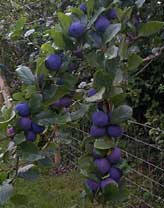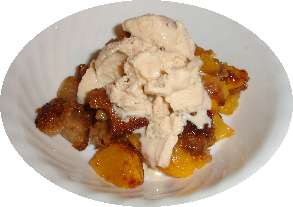
Plum U-Pick Orchards in Worcester County, Massachusetts in 2025, by county
Below are the U-Pick orchards and farms for plums that we know of in this area.
Not all areas of a state have plums orchards that are open to the public. If you know of any others, please tell us using the add a farm form!
Remember to always check with the farm's own website or Facebook page before you go - or call or email them if they don't have a website or Facebook page. Conditions at the farms and crops can change literally overnight, so if you want to avoid a wasted trip out there - check with the farm directly before you go! If I cannot reach them, I DON'T GO!
PLEASE report closed farms, broken links and incorrect info using the "Report Corrections" form below.
New! As inflation remains high, see this page for
reliable (tested) brands of generic canning lids at lower
costs, and cost-saving measures for
getting fruit and vegetables and home canning.
If you are having a hard time
finding canning lids, I've used these, and they're a great price & ship in 2 days.
New! Road tripping and camping is a great way to have a fun, safe and inexpensive family trip. The national and state parks and monuments are open, and campgrounds usually cost between $10 and $40 per night. September to November is the best camping weather. See our new website Road Tripping and Camping.com for tips, tricks, guides, checklists and info about parks, monuments and other places to visit.
New! We just went live with our latest website, FunFactoryTours.com - As they name implies, you can find a fun factory tour, including chocolate, automobiles, historical forts and sites, famous buildings, Active Federal facilities even fun geology: like fossils and volcanic areas
Worcester County
- George Hill Orchards, Inc - Minimizes chemical and pesticide use, apples, blackberries, blueberries, grapes, nectarines, peaches, plums, pumpkins, rhubarb, gift shop, snacks and refreshment stand, restrooms, picnic area, face painting, pony rides, petting zoo, farm animals, birthday parties, weddings and wedding parties, school tours, events at your location (call for info)
582 George Hill Road, South Lancaster, MA 01561. Phone: 978-365-4331. Open: Check our website for PYO harvest conditions and hours. Directions: From Route 495, take exit 27 \\(Bolton Stowe\\). Take Route 117 \\(west\\) and drive 5.5 miles. Turn left onto Langen Road and drive 1.7 miles. Turn right onto George Hill Road. George Hill Orchards is up the hill on the left side. Click here for a map and directions. Payment: Cash, Check, Visa, MasterCard, Discover. Take Route 117 (west) and drive 5.5 miles. Turn left onto Langen Road and drive 1.7 miles. Turn right onto George Hill Road. George Hill Orchards is up the hill on the left side. . Check out our website for upcoming festivals, activities and harvest dates. We minimize use of pesticides and other chemicals. farm animals, baked pies and cider donuts, sand box play area (UPDATED: July 1, 2025, JBS)
Comments from a visitor on September 02, 2011: (positive) "This is the most amazing fall family experience! They have awesome parking (not far away from everything like some orchards). You take a hayride (free) out to the orchards, and it's a really pretty ride. You get off at whatever spot you want and then just wait when you're done for a wagon to come by. We went all the way to the Fram House Grille, where there was a band playing outside and people were si..
[ Click here to update the listing ] - Nashoba Valley Winery - apples, peaches, neactarines, plums
100 Wattaquadoc Hill Road, Bolton, MA . Phone: 978-779-5521. Email: email@nashobawinery.com. Open: daily from 10am to 5pm during harvest season. Directions: Exit 27 off Route 495, take Route 117 West l mile to blinking light, then left one half mile on left. All containers provided. Large groups by appointment, wine tours and tastings on Saturdays and Sundays. \\[ . Click here for a map and directions. Call for calendar of special events. All containers provided. Large groups by appointment, wine tours and tastings on Saturdays and Sundays. (UPDATED: July 1, 2025, JBS)
Comments from a visitor: " no longer offers strawberry picking"
[ Click here to update the listing ] - Tougas Family Farm - Apples, blackberries, blueberries, cherries, flowers, nectarines, peaches, plums, pumpkins, raspberries, rhubarb, winter squash, strawberries, pumpkin patch-pick in the field, pumpkin patch- already gathered from the field and prepicked produce, snacks and refreshment stand, restrooms, picnic area, tractor-pulled hay rides, wagon rides, face painting, petting zoo
246 Ball Street, Northboro, MA 01532. Phone: 508-393-6406. Email: tougasfarm@tougasfarm.com. Open: From May through Halloween, Hours vary by season; Always call or check picking conditions on our web site. Directions: From I290 take exit #24 \\(Church St\\), turn towards Bolyston, follow signs up Ball St 1.5 miles . Click here for a map and directions. Payment: Cash, Check, Visa, MasterCard, Discover. 5 miles . We have been declared a "Family Friendly" business, in addition to fruit to pick we operate a farm kitchen which features fresh fruit desserts, ice cream, baked goods and light lunch. Barnyard animals and a "Farmyard" playground keep the kids happy. (UPDATED: July 1, 2025, JBS) Note: visitors (September 22, 2008) reported that there are purchase requirements in order to enter the orchards. Be sure to verify their website (see this page) for the costs and current picking conditions. For photos and a blog from one visitor to the farm, see this page.
Comments from a visitor on October 11, 2010: (neutral) "Yes, this farm is well run and has everything--animals, hay/wagon rides, food, and good PYO fruit, however, it will be a long time before I go back, especially for apples. It is SO crowded, the lines are ridiculously long, and the prices are sky-high. If you want to take your kids, they each have to get a tote..
[ Click here to update the listing ]
Plum
Plum Picking Tips, Recipes and Information
In the U.S., Plums typically peak during July for Sugar Plums; August for Blue, Yellow and Red Plums. In order to produce good local plums, producers depend on ideal spring and early summer weather conditions, and no late frosts. If you are looking for a plum festival, see this page.
Before you leave to go to the farm:
- Always call before you go to the farm - Plums are affected by weather (both rain and cooler temperature) more than most crops. And when they are in season, a large turnout can pick a field clean before noon, so CALL first!
-
 Leave
early. On weekends, then fields may be picked clean by NOON!
Leave
early. On weekends, then fields may be picked clean by NOON! -
Some growers furnish picking containers designed for plums, but they may
charge you for them; be sure to call before you go to see if you need to
bring
containers.
If you use your own containers, remember that heaping Plums more than 14 inches deep will bruise the fruit on the bottom. Plastic dishpans, metal oven pans with 3 inch tall sides and large pots make good containers. - Bring something to drink and a few snacks; you'd be surprised how you can work up a thirst and appetite! And don't forget hats and sunscreen for the sun. Bugs usually aren't a problem, but some deet might be good to bring along if it has been rainy.
- You might want to ask whether the plums are! There are two major types of plums: "Freestone" and. "Clingstone". Freestone plums have flesh that slips easily away from the pit. Clingstones are a REAL pain, because the fruit tenaciously clings to the stone or pit! Most plum varieties grown today are freestone and are usually available (depending upon your location) from June through September. Some nectarines are freestone and some are clingstone. Freestone nectarines are available in June and July. Most plum varieties are clingstone.
Tips on How to Pick Plums
A plum is softer than most fruit, so it is important to pick a plum gently, with little pressure. Using the sides of your fingers rather your fingertips helps to avoid bruising. Grab the plum firmly and pull it straight off the branch. DON'T drop the plum into the basket, but set it in gently!
Typical 2019 Orchard Plum Pricing:
- Average price is $2.49 /lb.
Picking Tips:
How to tell if the plums are ripe!
- Attached to the tree: Plums are best picked when the fruit separates easily from the twigs. If it is hard to pull off the tree, it isn't ripe! Plums will not ripen further once removed from the tree (they only "soften")
- Color: Green is definitely unripe, but you can't use red color as an indicator of how ripe a plum is. Different plum varieties have differing colors, darker is usually better in any variety. Pick them when the ground color changes from green to yellow, orange, red or even blue or purple (or a combination).
- Softness: unless you like your plums very firm, pick your plums with just a little "give" when gently pressed. Plums at this stage are great for eating, freezing, and baking. Plums won't ripen very much after picking!
- Odor: It should smell sweet and ripe!
- Larger plums are riper.
- Sugar plums grow in clusters, so carefully select the plum you want out of the cluster.
- Place them gently in a shallow wide container, no more than 8-inches deep, to avoid crushing the fruit.
Marks on the Plums: Bugs (particularly squash bugs and stink bugs)
bite fruit during development and this results in some imperfections in the
plum. This is especially the case with organically raised fruit. These
look like dents in the plums if the plums were bitten by a bug when they
were young. This causes a spot that does not grow properly and makes a wrinkle
in the plum. There's nothing wrong with these plums. They may look funny, but
they will taste just as good as blemish-free plums, and it's better not to
have the pesticides!
When you get home
- Spread the fruit out on towels or newspapers and separate any mushy or damaged fruit to use immediately.
- Put a couple of days supply into the fridge, wash and cut the others and freeze them up!
- Even under ideal conditions plums will only keep for a week in a refrigerator, so for best flavor and texture, use them as soon as possible after purchase
Make preserves, can or freeze!
Easy directions, step by step, with photos
- plum jam
- plum jelly
- canned plums
- freeze plums
- canned plum pie filling to use in the winter
- plum pie recipe
- plum-blueberry pie
- plum salsa
- Plum chutney
- Spiced plums
- Plum butter
- Pickled plums
- Here are some great and easy plum desert recipes, like easy plum cobbler..
Plum dessert recipes
- Plum Cobbler
 This recipe is easy and
DELICIOUS!!!
This recipe is easy and
DELICIOUS!!! - Plum Torte
- Italian Prune Plums (Empress Plums)
How much do you need?
Raw measures:
- About 2 medium plums = 1/2 cup sliced plums.
- About 4 medium plums = 1 /2cup pureed plum.
- About 3 medium plums = 1 /2 pound of plums
Process yields (Raw amounts to processed amounts)
- 2 to 21/2 pounds of fresh plums yields 1 quart canned
- 1 lb of fresh plums typically yields 3 cups of peeled, sliced plums or 2 cups or puree.
- It takes about 10 plums to fill one quart jar of canned plums.
- An average of 171/2 pounds of fresh plums are needed per canner load of 7 quarts;
- An average of 11 pounds is needed per canner load of 9 pints.
- 1 bushel = 48 to 50 pounds, yields approximately 18 to 25 quart jars.
Plums-Average retail price per pound and per cup equivalent
Plum pit tips
It's best to remove plum pits before you cook the plums. Cherry, plum, and apricot pits also contain amygdalin; the latter two, in potentially harmful amounts. Fortunately, plum and apricot pits are sufficiently large and hard that few people intentionally swallow or chew them. (The unapproved anti-cancer drug Laetrile is a semisynthetic derivative of amygdalin; a cheaper version of laetrile produced in Mexico came from crushed apricot pits.) See this page for more information.
Nutritional Information
- plums are virtually fat free. A medium size plum contains less than one gram of fat.
- plums are naturally sodium free.
- plums have no cholesterol.
- plums are a low calorie snack. A medium size plum contains only 40 calories.
- plums contain vitamin A which helps us see in dim light.
- plums are considered a good source of fiber. The skin of a plum provides both roughage and fiber.
Temporary Storage Tips
- Ripe plums have a creamy or golden undertone and "plumy-sweet" fragrance.
- Plums should be refrigerated and used within a few days.
- Putting plums in a loosely closed paper bag at room temperature for a day or two can help soften firm fruit - but they won't become sweeter or ripen further - that stopped when they were removed from th etree.
- For best flavor, allow the fruit to ripen fully on the tree.
- Store at 33°F to 40°F and high humidity (a vegetable drawer in the fridge).
Other Local Farm Products (Honey, Horses, Milk, Meat, Eggs, Etc.)
(NOT pick-your-own, unless they are also listed above)
- Farm markets and roadside stands
- Local Honey Finder
- Local Meat, Milk and Eggs
- Venues: Farms, Wineries, Orchards for your event, wedding or party
- Easter egg hunts
- Children"s consignment sales
- Fruit and vegetable festivals
- Winery tours and wine tastings
- Horse rides, stables, lessons, trails
- Maple Syrup farms and sugarworks
- Bed & Breakfasts on Farms, Wineries, Ranches and Orchards
- Pumpkin patches
- Corn mazes
- Zombie Paintball venues
- Christmas Tree Farms & lots
- Environmental resources
- Consumer fraud information
- Wholesale food sources
- Resources for Farmers
Looking for canning equipment and supplies?
Water bath canner with a jar rack
Pressure canners for gas, electric and induction stoves: Presto 23Qt or T-fal 22Qt
Canning scoop (this one is PERFECT)
Ball Blue book (most recent version)
Jars: 8oz canning jars for jams
Find Other types of farms:
Farm markets and roadside stands
Road trips and camping resources
Local Honey, apiaries, beekeepers
Consumer fraud and scams information
Home canning supplies at the best prices on the internet!
Maple Syrup Farms, sugarworks, maple syrup festivals
Environmental information and resources
Farms For Your Event for birthday parties, weddings, receptions, business meetings, retreats, etc.
Festivals - local fruit and vegetable festivals
Get the
most recent version of
the Ball Blue Book
With this Presto 23 quart pressure canner and pressure cooker, you can "can" everything, fruits, vegetables, jams, jellies, salsa, applesauce, pickles, even meats, soups, stews. Model 01781

You can make jams, jellies, can fruit, applesauce, salsa and pickles with water bath canners, like this Granite Ware 12-Piece Canner Kit, Jar Rack, Blancher, Colander and 5 piece Canning Tool Set

